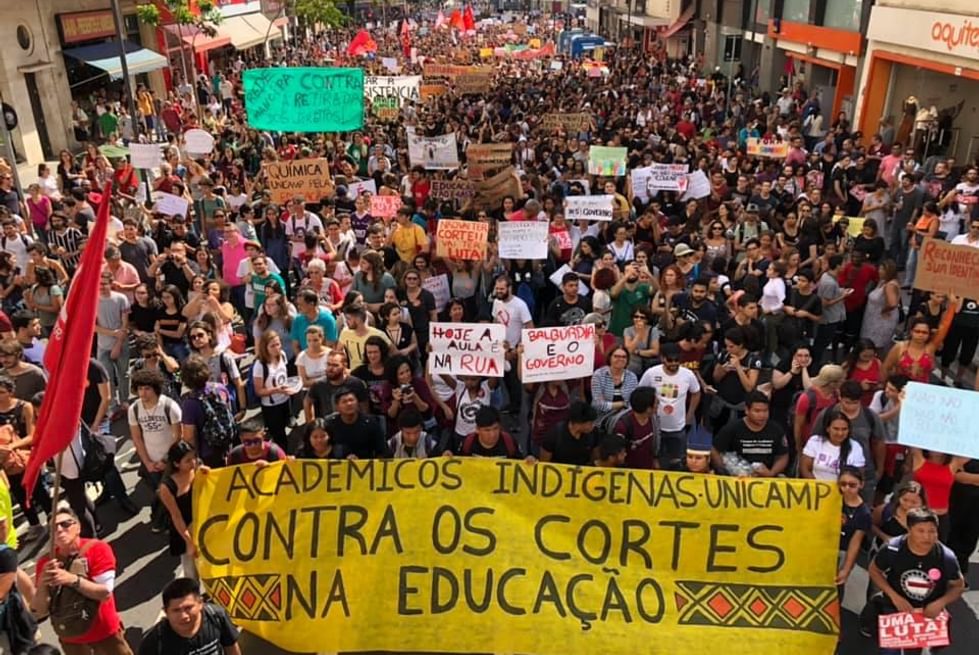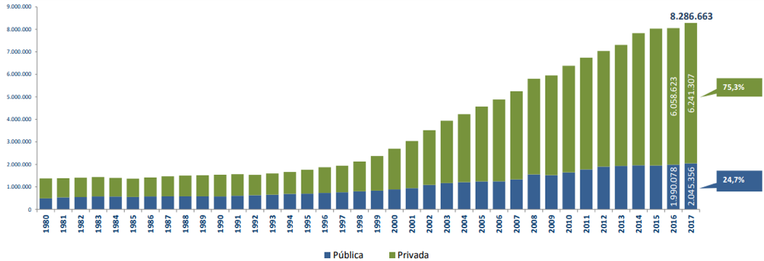Universities as a Battlefield in Brazilian Politics Today
From the Series: Bolsonaro and the Unmaking of Brazil
From the Series: Bolsonaro and the Unmaking of Brazil

Bruno has worked since he was a child, when he sold fruit. Today, in his early twenties, he is the first person in his family to get a higher education. He completed both his bachelor’s and master’s degrees in physical education at the University of Brasilia.
The University of Brasilia was created in the early 1960s.1 Sixty years later, Brazil is a different country, and the meaning of university in Brazilian society has also changed. Bruno faced opposition at home when he was accepted into university. His father especially did not want his son turning into a lazy bum.
His father’s and most of his family’s attitude is not only incomprehensible to many, but also unacceptable. What father in sound mind would disparage his children’s aspirations for higher education? What father in Brazil would disapprove of his son furthering his studies at a “public, free, and high-quality university”?
The University of Brasilia, along with 295 other entities spread across the country, is part of a set of higher education institutions that charge no tuition fees. The process of being accepted is highly competitive; public universities in Brazil have the highest indexes of academic excellence, according to the Federal Agency of Education, the institution that oversees these institutions.2 But once students are admitted, they no longer have to worry about monthly fees and can, in theory, dedicate themselves exclusively to learning.
During the developmentalist dictatorship period (1964–1985), higher education expanded significantly, with an increase of 1,332 percent in two decades.3 More recently, in the period known as the “Lula Administration,” Brazil experienced another exponential increase in enrollments, with significant growth in the private sector. Between 2003 and 2014, eighteen new federal universities were created—a growth of 40 percent—and 173 campuses were established, primarily in regions with little assistance from federal universities—a growth of 117 percent.

In the background of this expansion of universities, social movements worked in favor of affirmative action mechanisms which culminated in, for example, the decision to adopt a mandatory quota system for black people, after years of publicly ignoring the fact that not everyone could get into the best universities, much less black students or black professors.
Bruno was born and raised in a “satellite city” where he still lives with his family. Despite their differing opinions, his father did not kick him out of the house. They made a daily effort to put themselves in each other’s shoes. However, this was not enough to prevent them from experiencing particularly difficult moments in 2018. The family had campaigned and voted for the presidential candidate that ended up winning. Bruno was the only one in his house to vote for the other candidate during the second round of elections.
Inside their house, and in the heat of the moment, the “public, tuition-free, high-quality university” became a battleground on which family members fought. All sorts of arguments were used to attack Bruno:
Public? Whatever! Everyone there is a playboy!
Free? Whatever! The regular citizens are the ones paying for pretty boy here to study instead of work!
High-quality? Whatever! The stuff they learn there won’t fill anyone’s belly!
No matter how insulted he felt at times, Bruno never forgot that the only reason he was alive was because of his parents’ arduous efforts.
It is curious that this conservative attitude toward higher education—as a high-cost sector that caters to a dilettante, self-indulging elite that does not contribute anything useful to the people of Brazil—is not solely displayed by subjects with no privilege. The Head of the Federal Agency of Education himself was skeptical of the opportunity to invest public resources in institutions that supposedly encourage mayhem. Neither is it a contemporary innovation of public debate. It is enough to mention Brazilian positivists who resisted the belated structuring of Brazilian universities in the twentieth century.
In one way or another, this resistance persists and has become inflamed in today’s political and mediatic debates. Added to concerns about wasting public resources to promote extravagant and useless academic lifestyles were fears that young people were being indoctrinated to kneel to the prayer book of certain leftist political groups. In short, some parents and many Level I Executives now doubt the utility of higher education programs and condemn blind subservience to it, especially in the area of the humanities.4
The vituperations of high-level federal authorities against universities have been reciprocated in kind. On May 14, 2019, in all the Brazilian capitals, university students and high schoolers aspiring to enter university led protest marches against cuts to the education budget. In response, the president elected at the end of 2018 declared that the students were useful idiots and pawns.
None of this seems to shake Bruno’s resilience in any way. Yet he did feel beleaguered and torn apart when he heard, in his own house, a protest he did not know how to cope with: in their minds, no one in the family had been black until he enrolled in that public, tuition-free, high-quality university.
In other words, until now, the subject of skin color had never been an issue. No one is white where they live. But Bruno, at the encouragement of the public school he attended, had gone through the university’s entrance examination process as a black candidate (through affirmative action mechanisms), and then had become even blacker over the years as a university student. To Bruno’s family, having a black son is reason for intense internal conflict.
The current proposal to make higher education a commodity sold to whomever can pay for it, which ignores claims for historical reparation, re-edits Brazil’s fallacy of racial democracy and meritocracy. Privatization policies propagate the notion that in order for higher education to be high-quality, it can be neither public nor tuition-free. The current administration placates the market while at the same time relegates the problems of racism and inequality to individual inventiveness. If Bruno’s father could have paid for his son’s university studies, he would not have faced the dilemmas produced by a racist rhetoric that puts the merit of quota students in question. However, as a street seller it would have been practically impossible for him to pay for it. Thus, his son would probably never have made it through the academic walls of the university, and the controversies his family experienced would probably never have entered their home. An important lesson, if any, has been learned by everyone immersed in this battlefield: there is a clear need for the university to cure itself of its own elitist servility established according to academic patterns determined in latitudes where academic excellence has always walked hand-in-hand with white privilege and the corporate interests of capital.
1. Its founder was anthropologist Darcy Ribeiro (1969), who lamented that the military coup d’état had destroyed “the most ambitious project of Brazil’s intellectual community, reducing it to an effigy of a university awaiting restoration.”
2. Of the higher education programs that achieve maximum scores on national evaluations, 83 percent are offered by public institutions.
3. Enrollment jumped from 93,902 in 1960 to 1,345,000 in 1980.
4. “What is your plan for federal universities? [The Head of the Federal Agency of Education replies]: Brazil spends too much and the objective results of its scientific production for the population are low. . . . We have to choose our priorities better . . . I’m not against philosophy, I like to study philosophy. But, think about a family of small farmers whose son got into university, and four years later comes back home holding an anthropology degree?” (Agostini 2019).
Agostini, Renata. 2019. "Novo Ministro da Educação defende tirar Bolsa Família de aluno agressor." O Estado de São Paulo, April 10.
Ribeiro, Darcy. 1969. A universidade necessária. Rio de Janeiro: Paz e Terra.